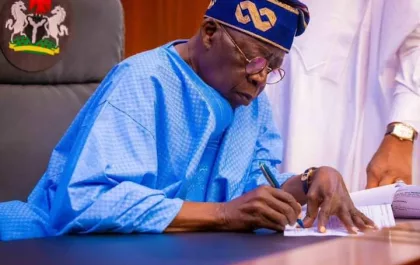Advertisement
2023 GOVERNORSHIP AND
STATE HOUSE OF ASSEMBLY ELECTIONS
- days
- Hours
- Minutes
- Seconds
Advertisement

A fresh initiative by the National Judicial Council to sanitise the judiciary ahead of the 2023 general election by punishing errant behaviour is a welcome development. Nigeria’s highest disciplinary judicial organ recently penalised three judges from courts of coordinate jurisdiction who recklessly granted ex parte orders to the same parties on the same subject matters. The judges were barred from gaining promotion when next they are due for it.
Juxtaposed with the havoc these judges have wreaked on the brittle integrity of the judiciary, their punishment is lenient; it will likely not deter delinquent judicial officers. The best course of action is to flush out judges tainted with the slightest whiff of corruption to restore confidence in the temple of justice.
Advertisement

In the Fourth Republic especially, the judiciary has been controversial, smeared by corruption and inconsistency. The latest clampdown by the NJC restores the topic to the front burner. The current matter centres around the divisive politics in the Peoples Democratic Party, where some party members went to court against Uche Secondus, the immediate past chairman. Instead of throwing out the frivolous suits and awarding steep costs against the litigants, the three judges granted ex parte orders in Rivers, Cross River and Kebbi states. The conflict arising from this is obvious. These devious court orders enable politicians to persist in their crooked ways, buying their way to power regularly and besmirching governance.
Ordinarily, the judiciary is seen as the last hope of the common man, especially in Nigeria where the legislature and the executive soil their hands with corruption. It is partly why the retribution for the three judges falls below expectation. Two of them were warned and stopped from being promoted for two years; the third was slammed with a five-year moratorium from being promoted. By not sacking the judges, the system is condoning corruption. Litigants will remain wary of the judiciary because of such judges. If the NJC is truly keen on fighting corruption, it ought to review and apply commensurate punishment on them.
Even before the NJC’s slap on the wrist for the judges, stakeholders had fretted over how the judiciary will remain above board in the run-up to the 2023 elections. Recently, all eyes were on the temple of justice in the pre-election cases in the November 6 Anambra governorship ballot after courts of coordinate jurisdiction in Anambra, Jigawa and Enugu states initially stopped Chukwuma Soludo, the eventual winner, from being listed as the candidate of the All Progressives Grand Alliance. It was the Court of Appeal that saved the day. Aiming to destabilise the polls, an Upper Area Court in Abuja in September directly issued criminal summons against Soludo, something the Chief Justice of Nigeria, Tanko Muhammed, noted was “completely outside the jurisdiction” of that court.
Similarly, a former chairman of the Independent National Electoral Commission, Attahiru Jega, recently argued that judicial corruption had undermined national development. He stated, “Some senior lawyers have become stupendously wealthy defending corrupt public officials or handling electoral litigation for governorship and presidential candidates. Many judges have also become notorious for corrupt enrichment through ‘cash and carry’ judgments, especially in election matters generally, and in election tribunals, more specifically.”
This strikes at the heart of the matter. Former Justices of the Supreme Court, the late Kayode Eso and Samson Uwaifo, had earlier separately warned of massive corruption in the judiciary. While Eso said some judges appointed to election petition tribunals became billionaires, Uwaifo cried out that corruption was creeping from the lower to the appellate courts. Lawyers, litigants, and their cohorts on the Bench form an axis of corruption. At the Supreme Court, judgements in cases like the 2015 Akwa Ibom State governorship election and the 2019 Imo State version remain indelibly incomprehensible to many. Some of the violence in Imo cannot be totally divorced from the controversial rulings.
Admittedly, the Major-General Muhammadu Buhari (retd.) regime has not been completely silent on judicial corruption. Alleging corruption, State Security Service officers, in an ill-timed operation, invaded the homes of two JSCs and two Federal High Court judges in Abuja in the middle of the night in October 2016. As expected, there was indignation over the misstep. Also, the anti-graft agencies have put some senior lawyers on trial. These lawyers are often convicted at the lower courts, but the verdicts are often overturned on technicalities at the Supreme Court. At the end of the day, nothing was achieved. It shows the regime has not devised a winning strategy to fight corruption in the judiciary.
The mess lies partly in the composition of the NJC. The Third Schedule, Section I of the 1999 Constitution empowers the CJN to appoint a sizeable number of NJC members. This confers too much power and influence on the CJN. It should be reviewed and independent members with integrity from other walks of life appointed through a transparent process.
A corrupt judicial system is a sign of a weak state because corruption undermines all institutions. With electioneering for 2023 set to kick in early in 2022, achieving a corruption-free judiciary should be paramount.
Elsewhere, there is zero tolerance for judicial corruption. Take the case of Rodolfo Delgado, a United States district judge in Texas State. In 2019, he was convicted of accepting bribes of $520 and $5,500 on separate occasions and obstructing justice. Of the verdict, Texas state Assistant Attorney General, Brian Benczkowski, said, “Corrupt judges can harm a community’s confidence in our judicial system. Today’s verdict takes an important step toward restoring that confidence and affirms that no one – especially not a judge – is above the law.”
This is how to treat corrupt judges. A constitution amendment is required to establish judicial councils at the state level, comprising the Bench, Bar, and laypersons of integrity.
The anti-graft agencies should not repeat their mistakes; after conducting their investigations on judiciary branch suspects, they should hand over the cases to the appropriate agency for prosecution. The NJC should come down hard on judges who undermine the polity with their reckless orders. They should be prosecuted and kicked out of the system.
Source: www.punchng.com
Disclaimer
Contents provided and/or opinions expressed here do not reflect the opinions of The Pacesetter Frontier Magazine or any employee thereof.
Support The Pacesetter Frontier Magazine
It takes a lot to get credible, true and reliable stories.
As a privately owned media outfit, we believe in setting the pace and leaving strides in time.
If you like what we do, you can donate a token to us here. Your support will ensure that the right news is put out there at all times, reaching an unlimited number of persons at no cost to them.
Related posts
Stay connected
Recent News
Tinubu Approves Comprehensive School Census, Education Reforms
Advertisement Nigeria’s President, Bola Ahmed Tinubu, has approved a census for all schools in Nigeria from basic to tertiary level,…
Enugu gov’t insists on quality, integrity, timely delivery of smart schools, healthcare projects across state
Advertisement Governor of Enugu State, Dr. Peter Mbah, has charged contractors and the site engineers handling construction of the 260…








